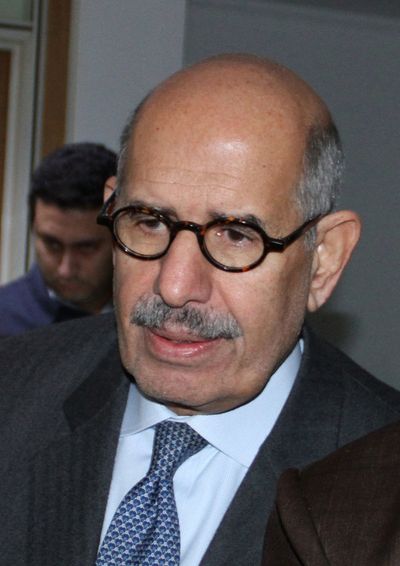Nobel winner drops out of race
Egyptian military’s grip on power cited

CAIRO – Nobel Peace Prize laureate Mohamed ElBaradei quit the race for the Egyptian presidency Saturday in protest over the military’s persistent grip on power despite a year of revolution and political upheaval.
ElBaradei’s announcement was a strategic and emotional setback for liberal and secular activists who had hoped the former head of the United Nations nuclear watchdog agency would propel the country toward democratic reforms to replace the corrupt legacy of deposed President Hosni Mubarak.
“I have decided not to run for the post of the president of the republic,” ElBaradei said in a statement. “My conscience does not permit me to run for the presidency or any other official position unless it is within a democratic framework.”
ElBaradei’s chances of winning the presidential election – scheduled for June – had dimmed in recent weeks. He could not muster the organizational prowess and appeal of Islamist parties, most notably the Muslim Brotherhood, the country’s dominant political force.
His announcement follows the turbulent arc of a protest movement that was unified in its early days but splintered as political and religious parties struggled against the omnipresent Supreme Council of the Armed Forces. ElBaradei has been an articulate voice against the power elite, but he has been outflanked by generals and the well-organized Brotherhood.
“ElBaradei feels there is an ongoing political game behind the scenes,” said Nabil Abdel Fattah, an analyst at the Al Ahram Center for Political and Strategic Studies in Cairo. “He decided not to take part in the game where a powerless and weak president will be chosen by the Brotherhood and SCAF to serve their interests.”
The former head of the U.N.’s International Atomic Energy Agency said the military’s hold on the country had become so pervasive, and so reflective of Mubarak’s police state, that it appeared as if “no revolution took place and no regime has fallen.”
ElBaradei has often posted Twitter missives criticizing the army for deadly crackdowns on protesters and for what he sees as media manipulation. When he returned to his native Egypt in 2010 after years of living abroad, he led the National Front for Change and was viewed as a fresh, uncorrupted and internationally respected voice.
But many regarded him as an outsider. He was criticized for leaving the country at crucial times; he later worked behind the scenes with a cadre of young social media activists that helped spark the uprising that led to Mubarak’s overthrow.